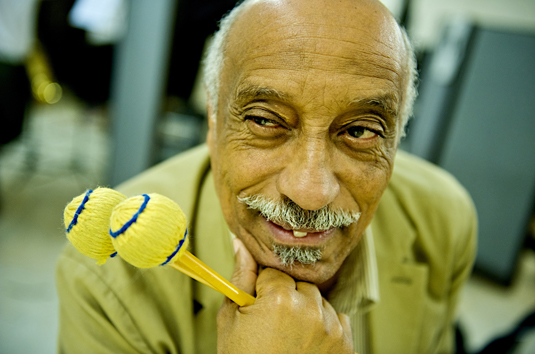 Mulato Astatke [Addis Abeba] Now it is the last day of Clandestino Festival. In two days you have experienced one fantastic musical experience after another. The brain is occupied with impressions and sights, the body is tender from the nights of dancing. It is just at this moment that we give you Mulatu Astatke to tie together the experiences with the best the world has to offer right now within alternative jazz. A little bit more for you to take. Then you may go home or maybe continue dancing under the summer sky inspired of mystical chords and sensual melodies.The king of Ethiopian jazz was born 1943 in Ethiopia but sent as a teenager by his family to Wales in order to study to become an engineer. It is unclear how it came to be that this young man chose to study music, first at two universities in London and then at the distinguished Berklee College of Music in Boston where he went more in-depth into vibration and percussion. His interest in Latin Jazz was shortly awakened and in 1966 he recorded two records in New York: ”Afro-Latin Soul” and ”Volumes 1 & 2”. With these Mulatu introduced the congos and bongos into Ethiopian music which came to be extremely popular in his homeland. Thus Ethiopian jazz was born but contained within it’s geographical area. First in the late 90’s Mulatu’s records were rediscovered internationally and seen by collectors as a rarity. There is something mystical about Mulatu’s arrangements, like following an oral crime novel in a hunt for the criminal or the lead up to a sensual scene in a Tarantino-film. Maybe it was these associations which captured director Jim Jarmusch when he asked Mulatu to compose the soundtrack for the acclaimed film Broken Flowers (2005). This led to a huge breakthrough and since then has this now energetic older man made a world renown name for himself as an artist and composer. During the 2000’s Mulatu has toured the world over with among others the Massachusetts-based jazz band Either/Orchstra and London-based jazz collective Heliocentrics. Together with Heliocentrics, Either/Orchestra and other leading jazz musicians from England has the album ”Mulatu Steps Ahead” been produced. The music has taken new directions with influences from West-oriented jazz with Ethiopian progressions to develop the unique sound Mulatu pioneered in the 60’s and 70’s. Each song has its own history to tell. “Radcliffe” was specifically composed for the Radcliffe Institute during Mulatu’s time as a lecturer at Harvard in Boston. “The Way To Nice” was written on the French country roads during a tour there, inspired by the turquoise calm which permeated the musicians’ senses. ”Assosa” adopted traditional music from the North-West tribe Assosa in Ethiopia together with newly arranged songs by Mulatu from the early 90’s. The result is magnificently swinging. It is now happening, dusk that is not there, quiet which endures nuanced melodies, emptiness filled of your and my hearts. The end is also the beginning, lightness.
Mulato Astatke [Addis Abeba] Now it is the last day of Clandestino Festival. In two days you have experienced one fantastic musical experience after another. The brain is occupied with impressions and sights, the body is tender from the nights of dancing. It is just at this moment that we give you Mulatu Astatke to tie together the experiences with the best the world has to offer right now within alternative jazz. A little bit more for you to take. Then you may go home or maybe continue dancing under the summer sky inspired of mystical chords and sensual melodies.The king of Ethiopian jazz was born 1943 in Ethiopia but sent as a teenager by his family to Wales in order to study to become an engineer. It is unclear how it came to be that this young man chose to study music, first at two universities in London and then at the distinguished Berklee College of Music in Boston where he went more in-depth into vibration and percussion. His interest in Latin Jazz was shortly awakened and in 1966 he recorded two records in New York: ”Afro-Latin Soul” and ”Volumes 1 & 2”. With these Mulatu introduced the congos and bongos into Ethiopian music which came to be extremely popular in his homeland. Thus Ethiopian jazz was born but contained within it’s geographical area. First in the late 90’s Mulatu’s records were rediscovered internationally and seen by collectors as a rarity. There is something mystical about Mulatu’s arrangements, like following an oral crime novel in a hunt for the criminal or the lead up to a sensual scene in a Tarantino-film. Maybe it was these associations which captured director Jim Jarmusch when he asked Mulatu to compose the soundtrack for the acclaimed film Broken Flowers (2005). This led to a huge breakthrough and since then has this now energetic older man made a world renown name for himself as an artist and composer. During the 2000’s Mulatu has toured the world over with among others the Massachusetts-based jazz band Either/Orchstra and London-based jazz collective Heliocentrics. Together with Heliocentrics, Either/Orchestra and other leading jazz musicians from England has the album ”Mulatu Steps Ahead” been produced. The music has taken new directions with influences from West-oriented jazz with Ethiopian progressions to develop the unique sound Mulatu pioneered in the 60’s and 70’s. Each song has its own history to tell. “Radcliffe” was specifically composed for the Radcliffe Institute during Mulatu’s time as a lecturer at Harvard in Boston. “The Way To Nice” was written on the French country roads during a tour there, inspired by the turquoise calm which permeated the musicians’ senses. ”Assosa” adopted traditional music from the North-West tribe Assosa in Ethiopia together with newly arranged songs by Mulatu from the early 90’s. The result is magnificently swinging. It is now happening, dusk that is not there, quiet which endures nuanced melodies, emptiness filled of your and my hearts. The end is also the beginning, lightness.
